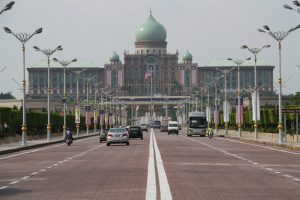Malaysia’s king has declared a state of emergency in order to curb an escalation of cases of COVID-19, which will suspend parliament and prevent any elections until at least August. King Al-Sultan Abdullah issued the unexpected order after consenting to a request from embattled Prime Minister Muhyiddin Yassin, who continues to be besieged by domestic political challenges.
The emergency will be in place until August 1, or until the pandemic is under control. During that time, Muhyiddin and his cabinet will be granted extraordinary powers, including the right to approve laws without parliamentary approval.
In an address to the nation on January 12, Muhyiddin announced that an independent committee would be formed to tackle the COVID-19 scourge, including health experts and parliamentarians from both sides of the aisle. “It is my duty as the head of government to take care of the lives of the people and protect you from the coronavirus,” Muhyiddin said.
He added that the essential services would continue as usual, and that there would be no curfew imposed. He also said that the emergency declaration ruled out the calling of snap general election, something that swirled over the past year as Muhyiddin has batted away political challenges from both sides of politics.
The announcement comes at a politically challenging time for Muhyiddin, who came to power in March 2020 after helping precipitate the collapse of the Pakatan Harapan coalition whose striking election victory in 2018 booted the United Malays National Organization (UMNO) from power for the first time since independence in 1957.
His slight-of-hand maneuver, executed with support from UMNO and other ethnic Chinese and Indian-dominated parties, left him holding just a razor-thin majority in the Malaysian parliament, one that has been under constant pressure. In September, perennial opposition leader Anwar Ibrahim claimed that he commanded a “strong, formidable, convincing majority” in parliament, which would enable him to replace Muhyiddin’s Perikatan Nasional (PN) government. But just as this challenge has faded, the Malaysian leader has faced increasing restiveness within his own political camp, in part because of the fragility of his political position.
In particular, relations between Muhyiddin’s Parti Pribumi Bersatu Malaysia (PPBM) and UMNO have steadily deteriorated since the latter threatened to withdraw its support from the government in October. That same month, King Al-Sultan Abdullah rejected a similar request from Muhyiddin to impose a state of emergency due to COVID-19, claiming that it was unnecessary. At the time, many suspected that Muhyiddin wanted the state of emergency to force through an important national budget without parliamentary opposition, an important political test that he ultimately passed anyway, by a slim margin.
Indeed, so strong was the perception of political motivations that Muhyiddin felt the need to reassure Malaysians that today’s emergency declaration was “not a coup.” He stressed that the main objective of the declaration was to curb the pandemic. “I emphasize that Malaysia is open for business,” he said. “In facing these challenging times, this period of emergency will give us much needed calm and stability, as well as enable us to focus on economic recovery and regeneration.”
To be fair, since October the COVID-19 situation in Malaysia has become considerably worse. The number of new daily infections in Malaysia hit a record high last week, and the country’s total of coronavirus cases passed 138,000 on January 11, pushing it back up into third place in Southeast Asia, just ahead of Myanmar. The country has also recorded 555 deaths from COVID-19.
Yet it is also true that the declaration grants Muhyiddin breathing room at a crucial time. On January 9, UMNO lawmaker Ahmad Jazlan Yaacob announced that he was withdrawing his support for the administration. Following the death of a UMNO parliamentarian in late 2019, this essentially wiped out the slim parliamentary majority of Muhyiddin’s Perikatan Nasional (PN) coalition, meaning that it no longer has the majority to pass legislation without opposition support.
Ahmad Jazlan’s decision came days after several UMNO leaders indicated that the party was set to withdraw its support for Muhyiddin’s PPBM, which would lead to a collapse of the government. While UMNO is not a formal part of Muhyiddin’s PN coalition, its support for the government is vital, given that it has 38 parliamentarians, compared to PPBM’s 31.
Indeed, the past few months have seen a split develop within UMNO, between those who prefer the status quo and those who are advocating a break from PPBM. This latter group wishes to go it alone at the next election, relying on its strong political networks and deep pockets to return it to power after its shock loss in 2018, amid the fallout from the gargantuan 1MDB corruption scandal.
Muhyiddin now has until at least August to get the COVID-19 contagion under control, and to strike the political alliances that might enable his coalition to survive the next election, whenever it comes. But this pandemic-induced delay may simply represent a stay of execution for an administration that seems destined to succumb to the same political in-fighting that brought it to power last year. As Norshahril Saat of the ISEAS–Yusof Ishak Institute noted today, “The state of emergency will expire on 1 August. This means politicking and jockeying for power will be deferred till then.”

































